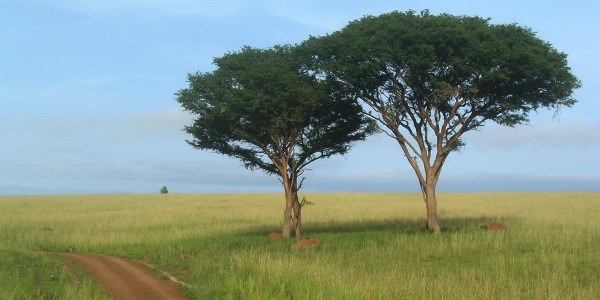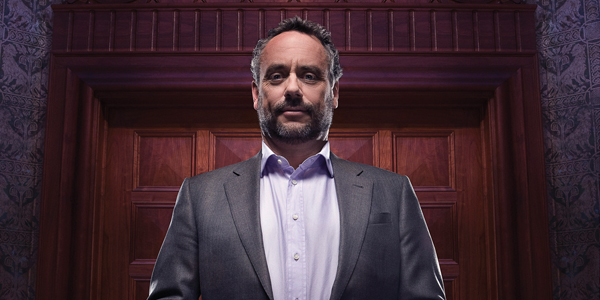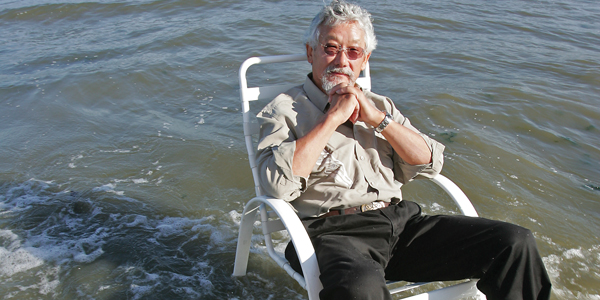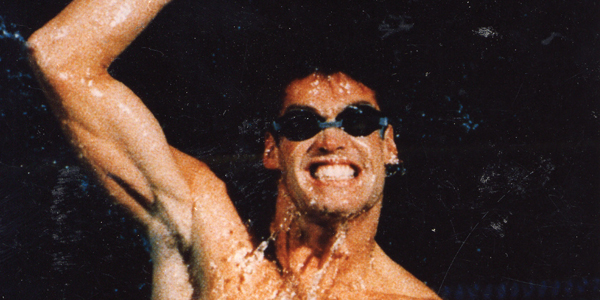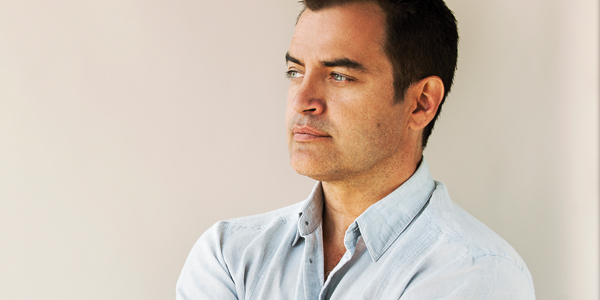As the Salama Shield drama group gyrates, the beat of African drums escalates. A snake-line of young and old dancers dressed in bright green and red writhe past. Their sweat-soaked faces shine as they dance with the joyful message of, “Hope with a Plan”.
Minutes away is the hot and dusty town of Lyantonde, where the unpaved main street is lined with pickup trucks and giant vultures. Lyantonde is definitely not on the radar of most tourists but it is “home away from home” for Salama Shield’s Canadian founder, Dennis Willms.
Dennis is a medical anthropologist who lost his heart to Africa 40 years ago. His Community Development Center in Lyantonde, Uganda – home to the drama group – is the enduring work of a man who is saving lives. Although designed for research, education, and training, the Center goes beyond being a permanent clinic for the extremely vulnerable community, whose history as a trucking HIV/AIDS corridor has taken its toll.
A walk through the centre’s lush, manicures grounds is a huge contrast to the harshness of the main street. Its harmoniously designed buildings lined with surprising columns and massive mahogany doors offer patient-friendly programs, a library, Internet Café, conference hall, sports facilities, and a peaceful gathering place for locals to chat with program managers.
But what drives a man to endure 16-hour flights, battle jet-lag, malaria, and regularly leave the comfort of his home and family? The answer is as complex as the man.
“I grew up feeling like I was always on the margins with my family, church, and in school. I was the one always at the back of the room. At 18, I thought I wanted to become a medical doctor, but I took one anthropology course and that was it. Anthropology introduced me to a larger world beyond my own upbringing. I discovered that there’s nothing clean about an anthropologist’s work; we study man-kind’s struggles and pain. It’s a messy, dirty science. But there’s moral beauty in that messiness.”
As a young man searching for focus in his academic life, Dennis left his home town of Kitchener, Ontario for Africa. That’s when he began to learn about the importance of being in the presence of others. And while working with traditional healers and learning about having calling and purpose, he discovered the work he was meant to do.
“I was conducting research at the height of the AIDS pandemic in my academic world at McMaster University. I was studying determinant risks of adolescent girls, and gathering rich, grounded data that I felt ethically bound to act on. But I couldn’t get academic donors to fund this work.” He pauses, smiles and, lowering his voice, continues, “That’s when something spooky happened. I was on a flight to Bangkok and had some extra time at a stop-over in Vancouver. I decided to visit a church, chose one at random, and sat in a back pew. I picked up the bible in front of me, and read the word ‘shield’. And out of nowhere, this acronym and name came to me instantly: Sustaining Health Initiatives, Enabling Local Development and ‘Salama’- and African greeting for peace. I knew in that moment that I would start a foundation from scratch. I didn’t know how I would do it. But I knew I would do it!”
Since that spontaneous revelation, Dennis’ vision of Salama Shield as a foundation that saves lives has been realized. But unlike many NGOs working in Africa, his approach is one of participatory development and creating partnerships with the intent of each party learning from the other, and what he describes as, “A sharing of vision and dreaming together.”
The Center in Lyantonde is a reflection of a shared dream. In dialogue with community leaders, Dennis asked, “How should we (Salama Shield) be in this place?” In the mid-1990s, Lyantonde was known the “hot-spot” for HIV/AIDS with the highest prevalence of HIV/AIDS in Uganda and in the world. It’s a place where female children were sexually compromised for clean water, food, and medicine. The town was in desperate need of a safe place for young people. His face brightens and his eyes fill with tears as he tries to describe the impact the Center has made on the community.
“Along with the library, and a place for children to play sports and other great facilities there, we also dug a well. Now, during the dry season, it’s the only green space in Lyantonde. Imagine what that means to the people!”
One of Salama Shield’s most significant projects is the “Ssengas and Koijas (aunt and uncle) program”. With over 900 individuals trained in the areas of HIV/AIDS, STIs, and mentorship, vulnerable youth are given at least one person in their life they can trust. Dennis defines the program as “A revitalization of an indigenous mentoring tradition that encourages aunts and uncles to pair up with young nieces and nephews. These are nurturing, one-on-one relationships.”
Dennis smiles when he confides that his family of staff in Africa endearingly refer to him as “The Professor”. It’s a title that suits the emotional man with blazing-blue eyes and soft voice. His tears of love, mixed with sorrow, flow easily when describing his work.
“When I go to Africa, I am not an employer or boss… I am home. We are souls meeting souls. You know, when you witness the most awful of abuse, poverty, and struggle, sometimes you have to cauterize your emotions just to get through the day. But as our mission statement says, we continue to have hope with a plan. We are building a vocational school in Lyontonde for 300 students, of which 150 will live in residence. Students will learn things like brick-making, weaving, hospitality, and catering. And they will be required to take the ‘What About Life’ course that looks at what it means to be a citizen in this world. Development work at this level becomes an adventure. It is my life.”
A more unexpected and recent adventure for Dennis is his role in the film, “Walking on Glass”, showcased at the Sundance Film Festival. The professor is not saying a whole lot about this movie that documents religion, politics, development, and his work in Sub-Saharan Africa, other than to humbly comment, “It was a bit forensic. I feel utterly exposed.”
Sitting in Dennis’ farmhouse office, renovated with extraordinary artifacts from Zimbabwe, Kenya, and Uganda gives you a sense of his indisputable love affair with Africa. “Every time I look at one of these paintings, sculptures, or cooking pots…” he laughs and says, “I have a lot of pots!… I’m reminded of their struggle. But interspersed in that struggle is a sense of peacefulness. Africans carry on. They’ve figured out rules of engagement that work. They understand that this world is a fragile space, and there needs to be trust.”
Dennis says he’s learned a great deal from the African people about what it means to be human. “For Africans, it’s really important to be in the presence of people. In their raw, muddy world, they are physically and emotionally with each other. It’s a nurturing process. We, in our cubical world of offices, Facebook, and Twitter have become distant.”
“Increasingly, I meet North Americans who want to learn and feel more. They may be successful in terms of finances and professionally and optically have perfect lives, but when they look in the mirror, they question: ‘Is there more?’ I think it’s healthy to be a little bit uncomfortable and to find your vulnerable space and learn from it. Working in Africa forces me to get real about what’s going on in the world… like an alarm clock that screams, ‘Don’t be that status-quo that kills your mind and spirit’. It keeps me real. I think more people would come alive if they stepped into the margins.”
To learn more about the work of Dennis Willms and Salama Shield visit: www.salamashield.org.

